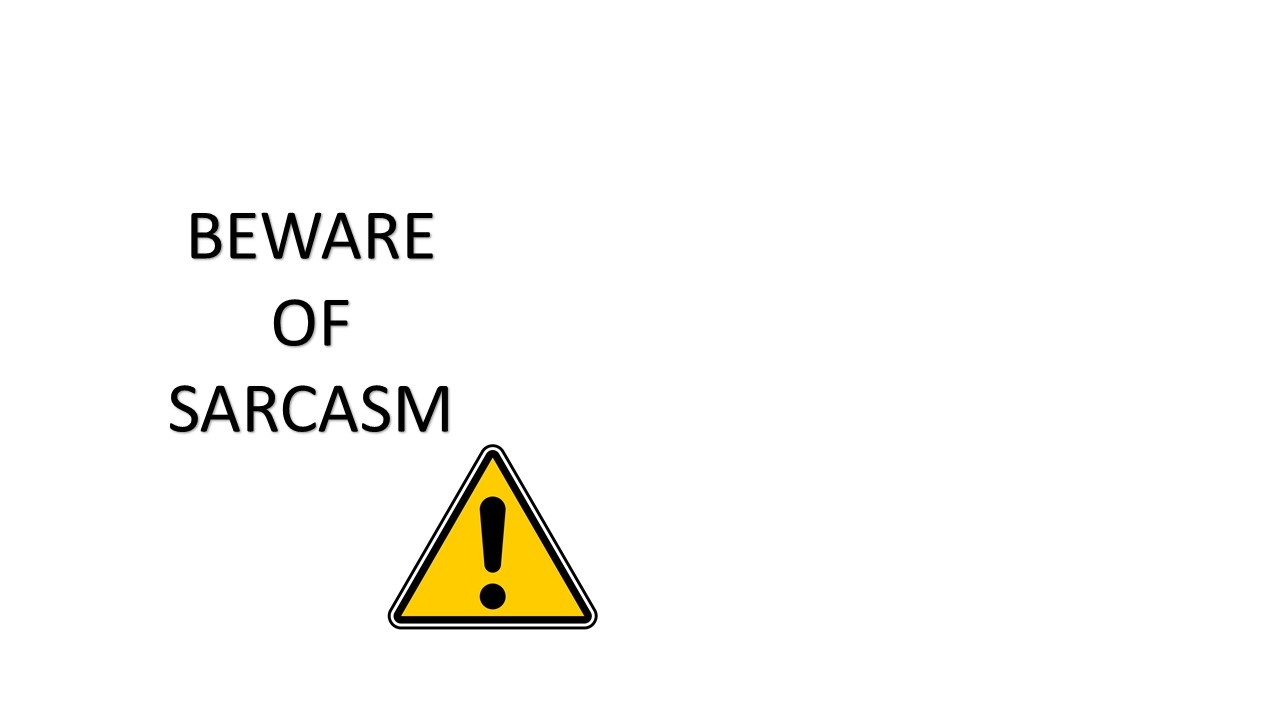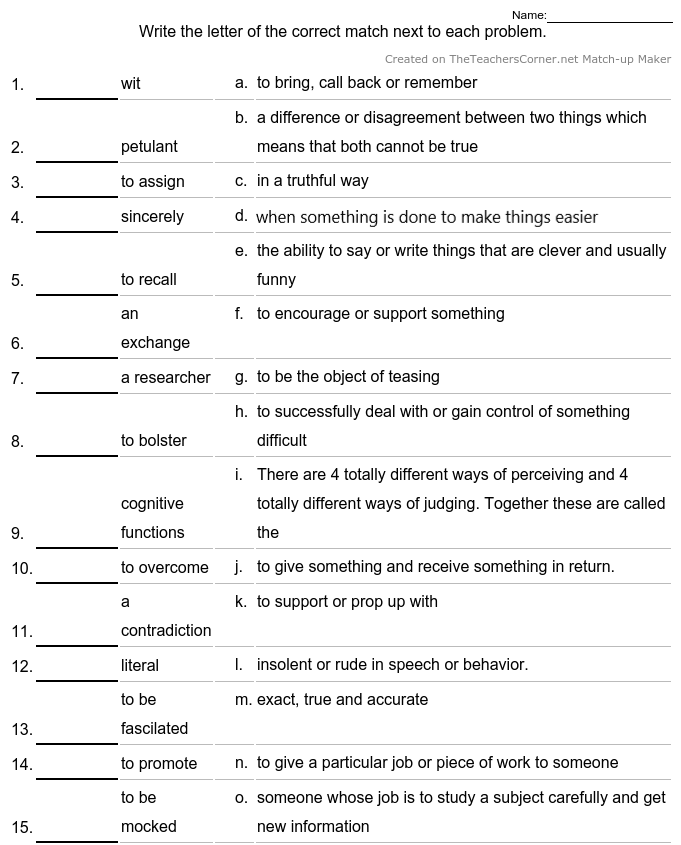October is known for Halloween and Thanksgiving Day in some countries, but have you heard that October is also a month of sarcasm?
Let’s not miss the opportunity to introduce the concept of sarcasm to our students.
These ideas for a lesson suit Intermediate and higher levels. These tasks might be especially interesting for your teens.
Have fun and beware of sarcasm!
Task 1. Warm up
What comes to mind when you hear the word “sarcasm”?
How would you define “sarcasm”?
Task 2. Lead in
Look at some interesting quotes about “sarcasm”.
Which one suits you best?



Task 3. Discussion about sarcasm
Discuss the questions
- Did you know October is considered to be National Sarcastic Awareness Month? Why do you think it is so?
- How can we celebrate National Sarcastic Awareness Month?
- How can you understand if someone is being sarcastic with you?
- Can sarcasm be offensive? How can we avoid being offensive when using sarcasm?
- Can we be sarcastic with everyone?
- Can you learn to use sarcasm and upgrade your skills at it?
Possible ideas:
- Nobody actually knows why but welcome any ideas from your students however crazy you think they are.
- We can keep being sarcastic without crossing the limits; we can learn to use “safe sarcasm”, share memes and funny sarcastic quotes with our friends, create your own sarcastic statements and so on.
- Mostly it becomes clear from someone’s tone of voice, body language or facial expressions.
- Of course, it can be offensive. We should be very careful when being sarcastic with others because some people might have a tough time picking up on sarcasm. It’s crucial to say sorry to another person if you offend them with your witty remark.
- Not really. As it was mentioned in the previous answer, we should make sure people understand that we are being sarcastic and can take it easy. As a rule, these people are our friends and the ones who know us quite well.
- That’s a matter of opinion, but you can say that nothing is impossible. And if the person wants to improve their level of sarcasm, they can do it by practicing.
Task 6. Vocabulary presentation
Match the words with their meanings

Keys:
1 — e; 2 — l; 3 — n; 4 — c; 5 — a; 6 — j; 7 — o; 8 — k; 9 — i; 10 — h; 11 -b; 12 -m; 13 — d; 14 — f; 15 — g;
Task 7. Watching a video
Watch the video. Answer the questions
Questions
- What does a new study published in Organisational Behaviour and Human Decision Processes show?
- How can sarcasm be helpful?
- What does “safe sarcasm” mean? How can you use it?
- What types of people may have a tough time picking up on sarcasm?
- Do you agree that “sarcasm is the lowest form of wit”?
Keys:
- The study suggests that sarcasm has the potential to catalyze creativity in everyone.
- As stated in the previous answer, sarcasm can boost creativity for both expressers and recipients. Moreover, it helps us to feel confident in different social situations when others are joking or criticizing something in a sarcastic manner.
- “Safe sarcasm” means a kind of sarcasm that will certainly be understood by others. Usually these people are your friends, because you know each other quite well and can be sure that being sarcastic won’t hurt any of you.
- People with an autism spectrum disorder usually have a hard time understanding sarcasm and may take sarcastic speech literally.
Task 8. Reading about sarcasm
Read the text. Think of the most appropriate heading for it.
Communicating would be a lot easier if everyone just said what he or she meant. But they do not; sometimes people are sarcastic and actually say the opposite of what they mean. Why do people do this? How do we learn to understand sarcasm? What happens in our brains when we are processing sarcasm?
In Harry Potter and the Half Blood Prince, there is a scene where Harry is leaving the Weasley house and Mrs. Weasley says: “Promise me you will look after yourself…stay out of trouble….” Harry responds: “I always do Mrs. Weasley. I like a quiet life, you know me.” Anyone familiar with Harry Potter knows that his life is far from quiet, and so he must not really mean what he is saying. In fact, Harry is being sarcastic.
Sarcasm is a form of everyday language in which the speaker says the opposite of what he or she means, typically with a distinct tone of voice, to be critical in a funny way. It has been part of human language for thousands of years. We often use it to be funny, just as Harry does when he speaks sarcastically to Mrs. Weasley. He is trying to be funny and succeeds in making Mrs. Weasley chuckle. We also use sarcasm to talk about things that have not gone the way we expected: we were hoping for good weather for our baseball tournament and it rained, so we say “Great day for a baseball game!” When these things happen, sarcasm can be one way of pointing it out, or criticizing, and at the same time being funny. Some sarcasm is very familiar; sayings like “Yeah, right” or “Thanks a lot” are often used sarcastically. These familiar forms of sarcasm are the type that children usually use first when they begin using sarcasm, around age four or five. Adults and older children often use more complex and creative forms of sarcasm, like Harry does in the example above.
Most adults hear sarcastic speech every day and understand it without much difficulty. To understand sarcasm, they rely on the speaker’s tone of voice, facial expression, and their knowledge of what the speaker is referring to and how the speaker might feel about it. However, some people struggle to understand sarcasm and tend to think the speaker literally means what he or she has said. The literal meaning is the actual, dictionary meaning of the words used. If you do not understand the sarcasm in what a person says, you miss the joke and may feel left out of the conversation. This can lead to some difficult social situations.
Mark the sentences True or False. Correct the false statements.
- Harry Potter is known for having a quiet life.
- You can distinguish sarcasm if you pay attention to a person’s tone of voice.
- Sarcasm isn’t used for criticizing something.
- Phrases like “yeah, right” and “thanks a lot” are often used sarcastically.
- Children usually start using sarcasm when they are four or five
- Adults have a hard time trying to “decode” sarcasm.
- Understanding sarcasm doesn’t have any effect on your social life.
Keys: 1. False.Anyone familiar with Harry Potter knows that his life is far from quiet
- True
- False. Sarcasm can be one way of pointing it out, or criticizing, and at the same time being funny.
- True
- True
- False. Most adults hear sarcastic speech every day and understand it without much difficulty
- False. If you do not understand the sarcasm in what a person says, you miss the joke and may feel left out of the conversation. This can lead to some difficult social situations.
Adapted from: https://kids.frontiersin.org/article/10.3389/frym.2018.00056
Task 4. Writing about sarcasm
Complete the following sarcastic quotes with your ideas. Compare them with the original sayings
- It’s okay if you don’t like me.___________
- “Everyone seems normal until ______
- I feel miserable without you. _______
- Silence is gold. _________
- Find your patience before _______
- “If at first, you don’t succeed, ______
- “Don’t worry about what people think. ______
- “Always remember that you’re unique. Just like _______
Keys: “It’s okay if you don’t like me. Not everyone has good taste.”
“Everyone seems normal until you get to know them.”
“I feel miserable without you, it’s almost like having you here.”
“Silence is golden. Duct tape is silver.”
“Find your patience before I lose mine.”
“If at first, you don’t succeed, skydiving is not for you.”
“Don’t worry about what people think. They don’t do it very often.”
“Always remember that you’re unique. Just like everyone else.”
Source: https://www.quoteambition.com/sarcastic-quotes/
Task 5. Role-play
Role-play the situations
Imagine you need to respond to these phrases in a sarcastic manner. Remember, try to be as witty as you can without offending another person
- How was school today?
- How is life?
- What do you like doing in your free time?
- What are your strengths and weaknesses?
- You sound very pessimistic
- You look exceptionally good today. Is it your birthday?
Additional Task
Hot Topic Discussion
Can a person be both sarcastic and friendly at the same time? Support your ideas with relevant examples.
When talking about yourself, should you mention “sarcasm” as one of your personal traits? Why or why not?
How can being sarcastic help you in life? Or will it make your life worse?






 Вероника Аветисян
Вероника Аветисян 
 Маргарита Аветисян
Маргарита Аветисян 



Your materials are interesting, actual, and fresh. More ever, I have never heard about the holiday. So, you have widened even my outlook. Thanks a lot.
❤